Neale Daniher timeline
Born: February 15, 1961 (57 years old)
Place of birth: West Wyalong, New South Wales
Recruited from: Ungarie/Assumption College
The third child – and one of 11 children – of Jim and Edna, Daniher grows up in Ungarie, in the Central West region of New South Wales. During his childhood, he plays Australian Rules, rugby league and rugby union. He wins several best and fairest awards playing Aussie Rules. Daniher attends primary school at St Joseph’s Catholic Schoool, Ungarie, before going to St Patrick’s College, Goulburn and then Assumption College, Kilmore for secondary schooling. He then attends Royal Melbourne Institute of Technology University, studying emerging technologies. In 1978, Daniher is approached by Essendon and South Melbourne for his services. After a legal wrangle, Essendon wins the right to recruit Daniher, as South Melbourne previously signs a contract saying that the Bombers have the ‘right’ to claim him. This is due to South Melbourne trading older brother Terry to Essendon in exchange for Neville Fields. Daniher’s journey starts in the VFL/AFL …
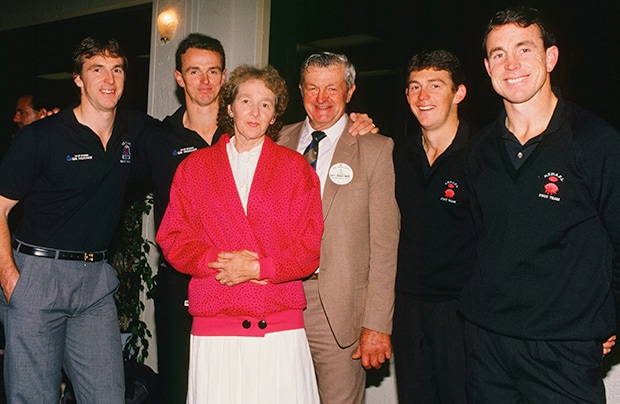
The four Daniher boys with parents Jim and Edna at a NSW State of Origin function in 1990
1979
Makes his VFL/AFL debut for Essendon under coach Barry Davis against Carlton at Waverley Park on March 31. Although it’s classified as a round three game, it’s played as a standalone match on the Saturday before round one. He notches up 22 disposals and plays 23 games in his first season, including the elimination final loss to Fitzroy. Daniher is named VFL recruit of the year, wins Essendon’s best first year players and receives nine Brownlow Medal votes.
1980
Plays all 22 games for the Bombers and represents Victoria in State of Origin football.
1981
Under new coach Kevin Sheedy, Daniher makes another 21 appearances for the Dons. Has a career-best 28 disposals against Melbourne in round 19 at Windy Hill. Plays in the club’s night premiership against Carlton, wins Essendon’s best and fairest award and represents Victoria. He forges a reputation as one of the best young players in the game. He produces a match-winning performance against Carlton at Princes Park in round 20, kicking the last two goals of the match. Unfortunately, in round 21 against South Melbourne at Windy Hill, Daniher suffers a serious knee injury, which interrupts the rest of playing career.
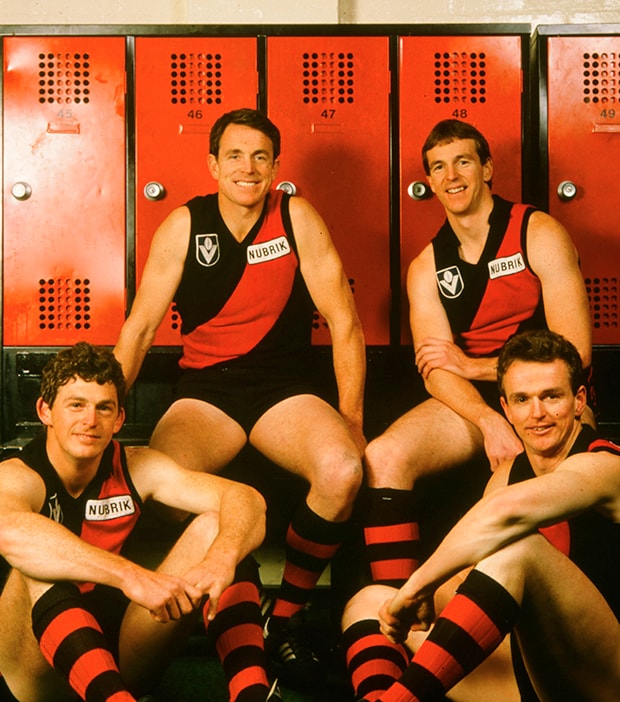
Daniher with brothers Chris, Anthony and Terry while all four played at the Bombers in the 1980s
1982
At just 21 years old, he becomes the youngest person to be appointed Essendon skipper, but misses the entire season with a knee injury. Ron Andrews captains in his absence.
1983
Sidelined for his second consecutive season, due to his knee injury.
1984
Out for a third successive season, as the Bombers win their first grand final since 1965.
1985
Remarkably, returns to play at the highest level, playing five matches for the Dons, from rounds nine to 13. He makes his return against Melbourne at Windy Hill. But it’s in his fifth match, against Fitzroy at Windy Hill, that he suffers another shocking setback, injuring his same knee. He misses the rest of the year and misses out on playing in Essendon’s second consecutive premiership.
1986
Again, sidelined for the year.
1987
Daniher undergoes his third knee reconstruction.
1988
Misses his third season in a row, and his sixth from his past seven seasons.
1989
Incredibly, returns to play four matches for Essendon. He returns in round 12 against the Sydney Swans at Windy Hill to play his first VFL/AFL match in four years.
1990
Redrafted by Essendon at No.46 in the pre-season draft. Daniher plays seven matches for the Bombers. He features in New South Wales’ upset State of Origin win over Victoria at the SCG. Daniher plays with brothers Terry, Anthony and Chris in the famous win. It’s the first time four brothers have played in the same State of Origin team. Terry, Neale, Anthony and Chris then play in the final round of the season for Essendon against St Kilda at Moorabbin Oval. It’s the first time all four Daniher brothers play in the same side for the Dons. It’s also Neale’s final game for Essendon. He kicks 3.4. Daniher retires with 82 games and 32 goals for Essendon. The Bombers later fall to Collingwood by 48 points in the Grand Final at the MCG.
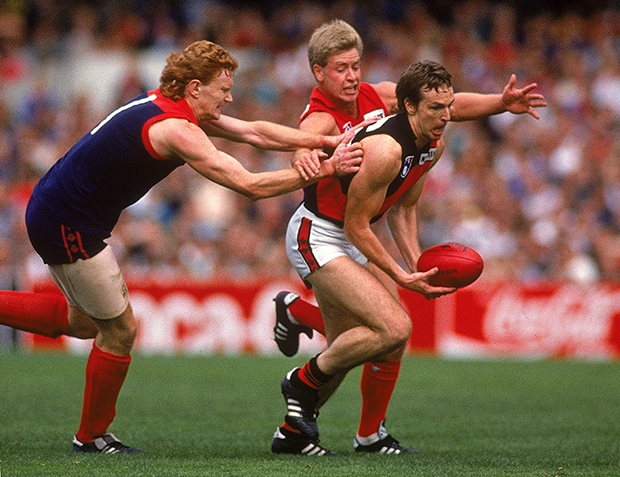
Daniher in a match against Melbourne in 1990
1991
Daniher spends a season with Werribee in the VFA/VFL. He plays 19 games and kicks 44 goals and plays in Werribee’s Grand Final team.
1992
Daniher becomes an assistant coach for Essendon.
1993
Part of Essendon’s premiership coaching panel, as the ‘Baby Bombers’ defeat Carlton under coach Kevin Sheedy to win the flag. Daniher is credited with identifying a Carlton set play at centre bounces, which enables the Bombers to nullify the Blues in the premiership.
1994
Spends his last season with Essendon’s coaching staff, before joining the newly-formed Fremantle as an assistant coach.
1995
In Fremantle’s first AFL season, Daniher is right-hand man to inaugural coach Gerard Neesham. The Dockers finish 13th with eight wins.
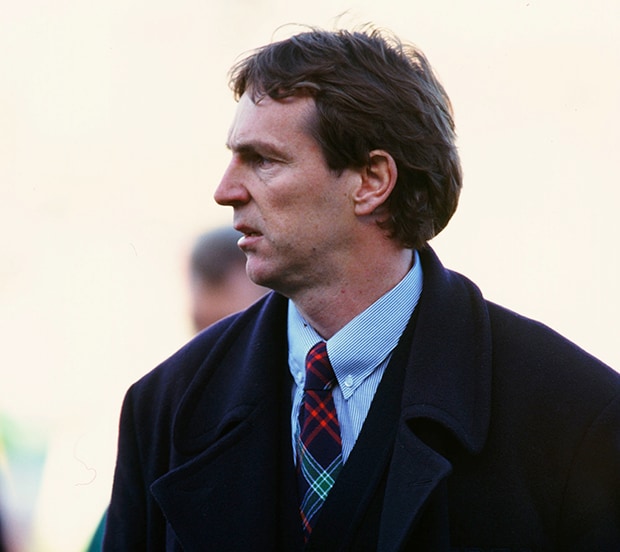
In his days as an assistant at Fremantle
1996
Continues as a Fremantle assistant coach, Daniher coaches The Allies against Victoria in State of Origin.
1997
His final season with Fremantle as an assistant coach, Daniher guides The Allies to victory over Western Australia at Subiaco Oval, before being appointed Melbourne senior coach in September 1997. Daniher takes over from caretaker coach Greg Hutchison. He edges Hutchison, Damian Drum and Peter Schwab for the position.
1998
In his first year with Melbourne, Daniher takes the team from a wooden spoon to fourth and a preliminary final. It’s an outstanding year from the Demons, which features the likes of Garry Lyon, Jim Stynes, Todd Viney, David Neitz and David Schwarz. The Demons also secure Jeff White, Jamie Shanahan and recruit Travis Johnstone. After suffering a loss in round one, Daniher guides Melbourne to five wins in a row. The Demons finish with 14 wins and plays Adelaide at the MCG in the first qualifying final. Melbourne easily accounts for the Crows, the eventual premiers, by 48 points. The Demons then defeat St Kilda by 51 points at the ‘G in the first semi-final. Melbourne then falls to the Kangaroos by 30 points at the home of football in the preliminary final. Despite missing out on a Grand Final berth, it’s extraordinary year by Melbourne, given it went from 16th to fourth. Daniher’s first contract, which is initially for 1998-99, is extended until the end of the 2000 season.
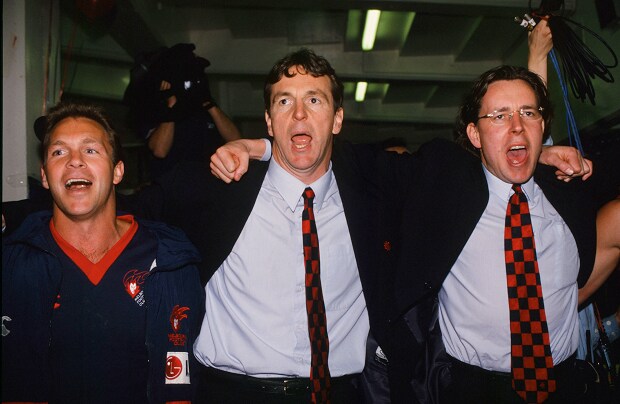
After a semi-final win against St Kilda in the 1998 finals
1999
Daniher’s second season as Melbourne coach is a disappointing one, as it falls back to 14th position, notching up just six wins.
2000
Daniher’s Demons bounce back significantly, playing in the Grand Final against Essendon. The only problem for Melbourne is that it plays statistically the greatest team in a single season, when the Bombers lose just one game for the season. From 25 games, Essendon drops just its round 21 game to the Western Bulldogs by 11 points at Docklands. Although Melbourne’s second Grand Final since its most recent premiership in 1964 is a terribly disappointing day – Melbourne loses to Essendon by 65 points at the MCG – it would’ve been a premiership against the odds. Shane Woewodin wins the Brownlow Medal playing under Daniher, who appoints David Neitz to lead Melbourne for the season. It’s an inspired choice. Neitz, a recent Australian Football Hall of Fame inductee, goes on to captain Melbourne in more matches than any other player.
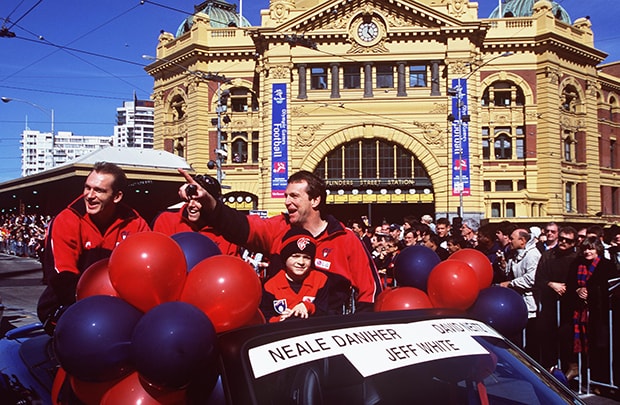
Daniher and skipper David Neitz in the 2000 AFL Grand Final parade
2001
After the highs of reaching the Grand Final, Daniher’s team slips out of the eight and finishes 11th.
2002
Melbourne returns to the finals, defeating North Melbourne in the second elimination final at the MCG. Daniher guides the team to a 38-point victory, before the Demons are locked in an epic battle against the Adelaide Crows at the MCG in the second semi-final. After Adelaide leads by 40 points at quarter-time, Melbourne produces a stunning fightback to enter the final term with a 22-point advantage. But the Crows rally in the last quarter to claim a 12-point win, ending Melbourne’s season. Daniher is named No.44 in the ‘Champions of Essendon’.
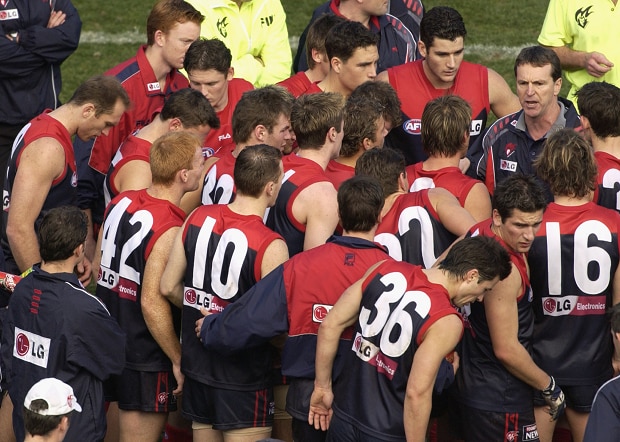
In the huddle during a 2002 match against Hawthorn
2003
Melbourne’s rollercoaster streak continues, with Daniher’s side falling back down the ladder to 14th position with five wins for the year. The Demons lose the last nine games and Daniher’s coaching position comes under scrutiny.
2004
With Melbourne facing tough times, on and off the field, Daniher makes a genuine effort to lift the club’s presence and becomes known as ‘The Reverend’. After reaching a semi-final in the Wizard Cup (the pre-season competition), the Demons win 14 of their opening 18 matches. In round 18, they sit on top of the ladder – the first time since rounds five to seven, 1994, when Neil Balme was coach. Melbourne finishes fifth at the end of the home and away season, but falls five points short to Essendon in the first elimination final at the MCG.
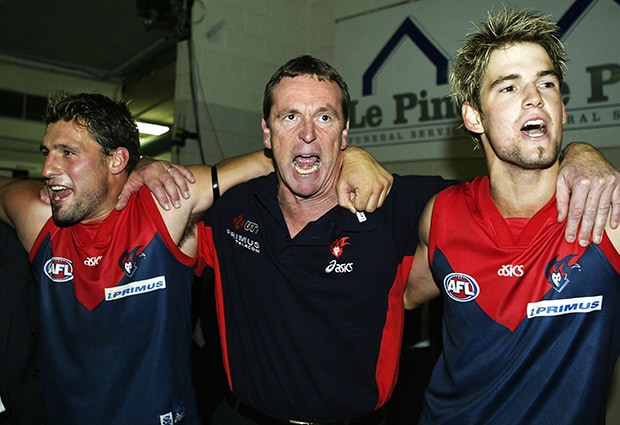
Celebrating a 2004 win over Richmond with Russell Robertson and a young Jared Rivers
2005
Daniher’s team starts the season in great style, winning the opening three rounds to sit first on the ladder after rounds two and three. By the end of the home and away season, Melbourne finishes seventh and plays Geelong in the second elimination final at the MCG. It’s the first time under Daniher that the Demons play in consecutive finals series. But the Demons are easily accounted for by 55 points and bundled out of September.
2006
Melbourne makes the finals for the third successive year under Daniher – the club’s best effort since playing five in a row from 1987-91. The Demons finish fifth, and defeat St Kilda in the second elimination final at the MCG – their most recent finals victory. Daniher’s team heads to Perth to tackle Fremantle in the second semi-final, but the Dees go down by 28 points. It proves to be Daniher’s last full season as coach and Melbourne’s most recent finals series.
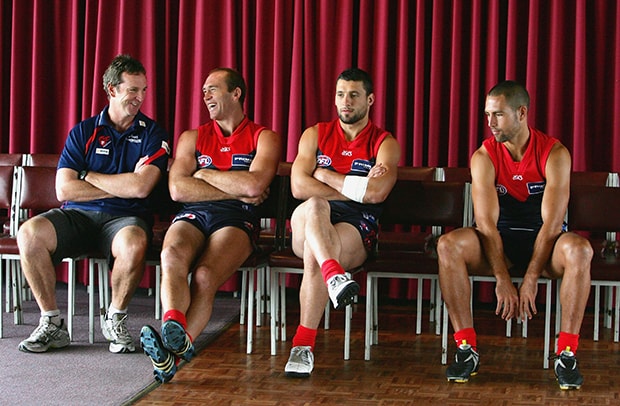
On 2006 photo day with Neitz, Robertson and Brad Miller
2007
Despite entering the season as premiership favourites, Melbourne has a poor year. The Demons lose their opening nine matches and after a disappointing loss to Richmond at the MCG in round 12, Daniher announces on June 29 that the clash against Essendon at Docklands will be his last as Melbourne coach. The Demons go down by two points. Mark Riley, who was an assistant with Daniher at Fremantle, before joining him at Melbourne, becomes caretaker coach of the Demons. At the season’s end, the late Dean Bailey is appointed Melbourne coach. Daniher finishes with Melbourne having coached the club in 223 games from 1998-2007, which including six finals series and a Grand Final in 2000. He becomes the third longest serving coach at Melbourne, behind premiership coaches Norm Smith and Frank ‘Checker’ Hughes. Daniher becomes chief executive of the AFL Coaches’ Association.
2008
Remains CEO of the AFLCA and is an assistant coach of the Dream Team, which plays Victoria at the MCG to celebrate 150 years of the game. On August 18, Daniher joins West Coast Eagles as its general manager of football operations.
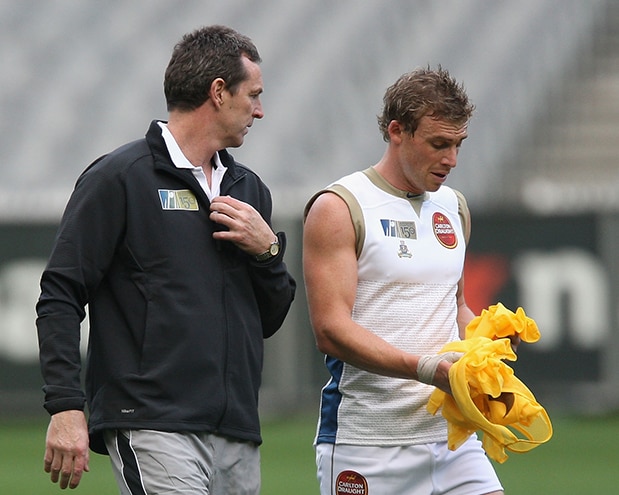
With a future Melbourne coach in Simon Goodwin at training for the AFL Hall of Fame Tribute match
2009
Daniher completes his first full year as West Coast GM of football operations. The Eagles win eight matches and finish 11th.
2010
West Coast collects its first wooden spoon, winning just four games.
2011
Daniher, in his third season with the Eagles, is part of the club’s stunning rise. The Eagles go from 16th and four wins to fourth and 17 victories. West Coast loses its first qualifying final to Collingwood at the MCG, before it bounces back with a first semi-final win over Carlton at Subiaco Oval. The Eagles then fall to Geelong in the second preliminary final at the MCG.
2012
The Eagles make back-to-back finals series, as they defeat North Melbourne in the first elimination final at Subiaco Oval, before falling 13 points to Collingwood in the first semi-final at the MCG.
2013
West Coast slips out of the eight, winning nine games. In September, Daniher stands down from his position as general manager of football operations, due to health reasons.
2014
Although he remains a football administrator with West Coast, in August, Daniher reveals publicly that he has motor neurone disease. He dedicates the rest of his life to educating people about the disease, and raises funds to help find a cure for the terrible ‘beast’.
2015
Becomes ongoing patron and vice-chairman of Cure for MND Foundation. He also becomes the face of the first ‘Big Freeze’ at the MCG on Queen’s Birthday, where a host of football personalities/celebrities slide down into icy water, before the Melbourne and Collingwood blockbuster at the MCG. The likes of Garry Lyon, Sam Newman, Dermott Brereton, Mick Molloy and Sam Lane go down the slide.
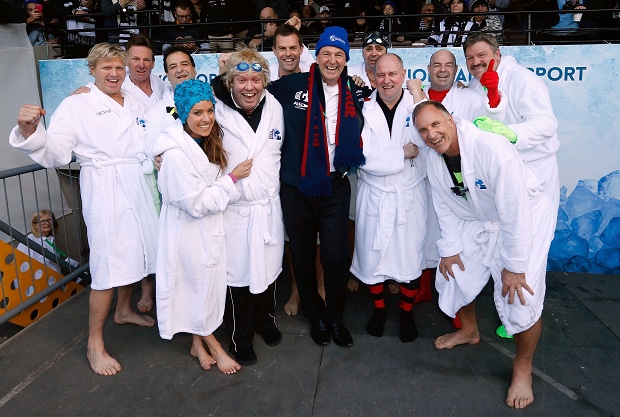
Daniher with the sliders in Big Freeze 1
2016
Daniher is awarded with the Member of the Order of Australia AM on Queen’s Birthday for services to community health – particularly raising awareness of people with MND and helping raise funds towards finding a cure for the disease – along with his contribution to Australian Rules. He is a recipient of the Herald Sun ‘Pride of Australia’. Daniher is also named Victorian finalist for Australian of the Year. The second Big Freeze is held on Queen’s Birthday, with the likes of Kevin Sheedy, Eddie McGuire, Matthew Richardson, Jonathan Brown and Samantha Armytage slipping down the slide into the cold water.
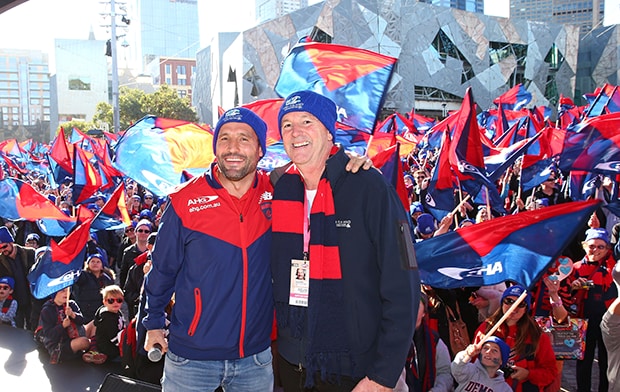
With Russell Robertson at Federation Square ahead of the Walk to the 'G
2017
Daniher continues his incredible work, with the third Big Freeze held. Sporting stars Adam Gilchrist, Andrew Gaze, Lleyton Hewitt, Sharelle McMahon and Steve Moneghetti are among the sliders before the Queen’s Birthday match.
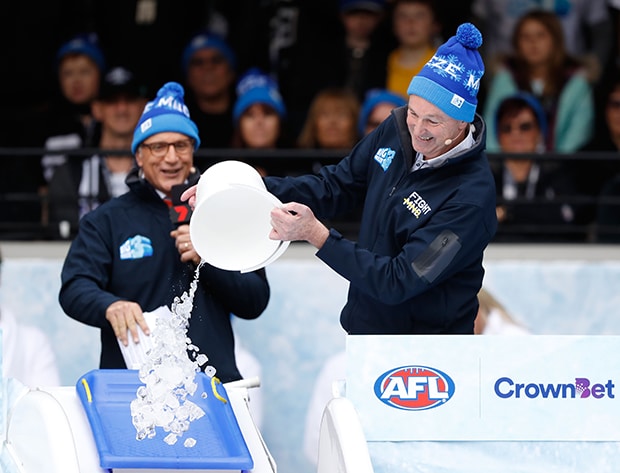
Warming the slide up for the 2017 event
2018
The fourth Big Freeze will be held this Monday, featuring all 18 AFL coaches going down the slide. To date, Daniher, and his Fight MND campaign has raised almost $30 million – with 90 per cent of funds dedicated to cure and care, seven per cent donated to awareness and three per cent towards admin. Daniher’s extraordinary work in the face of adversity continues to gain wide recognition and praise – not only from the football public, but from all sections of the community. All are full of admiration for him and he is widely regarded as a great Australian for the contribution he has made to the community, as he continues to fight ‘the beast’ that is MND.
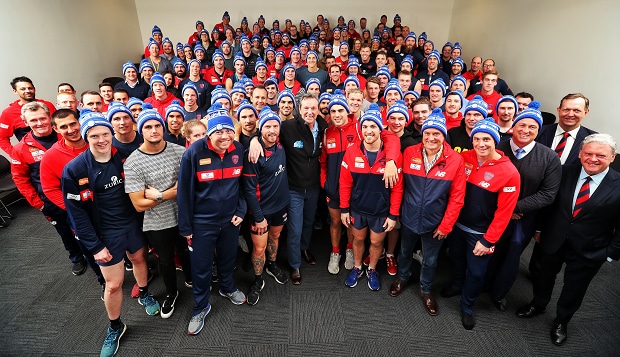
Daniher with the Melbourne Football Club players, staff and board ahead of the Big Freeze 4



